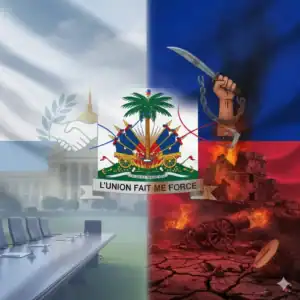Haiti began its new judicial year this week with a blend of ceremony and unease. While government officials praised progress in rebuilding institutions, streets across the country told a different story — one of frustration, protests, and calls for justice reform.
This is BioHaiti’s latest report on the evolving landscape of Haiti Judicial Reform 2025.
Prime Minister Alix Didier Fils-Aimé led the official opening of the 2025-2026 judicial year at the Supreme Court in Champ de Mars, where he emphasized the importance of strengthening the justice system to safeguard security and democracy.
Representing President Emmanuel Vertilaire, his adviser commended the judiciary’s commitment while urging for a system that operates with efficiency and fairness.
After the ceremony, the Prime Minister visited downtown Port-au-Prince to review cleanup operations. These efforts aim to restore key government offices in the capital and reestablish the heartbeat of the country’s administration.
Meanwhile, Laurent St-Cyr embarked on an official diplomatic mission to the United States and Japan. His journey began in Florida, meeting members of the Haitian diaspora, followed by participation in “Haiti Day” on October 11, 2025, during the Osaka Expo — a moment designed to showcase Haiti’s cultural resilience on a global stage.
But optimism was tempered by growing unrest in Saint-Marc, where self-defense groups forced schools to shut down, urging government action against armed gangs Grand Grif and Kokorat San Ras. The shutdown paralyzed business activity across the region.
The National Police Union (SPNH-17) expressed grief after the death of police trainee Charles Widensky on his first day at the Police Academy. The union is demanding an independent investigation to uncover the cause of his death.
In Jacmel, regional police director Magalie Belneau honored six retiring inspectors for their years of service, symbolizing the institution’s ongoing recognition of dedication and discipline.
Meanwhile, tensions remain high as the Transitional Presidential Council nears the end of its mandate on February 7, 2026. Civil society organizations like the Karl Leveque Human Rights Center continue to call for transparency and public awareness amid the uncertainty.
In Léogâne and Gressier, angry residents blocked National Route 2 after the government removed an armored police vehicle previously used in anti-gang patrols. Protesters vowed to keep demonstrating until the decision is reversed.
Despite schools officially reopening on October 1, insecurity in gang-held areas, including Kenscoff, prevents thousands of children from attending. The National Platform of Haitian Peasants warned that the country faces an “educational catastrophe” unless the government intervenes swiftly.
Lastly, SOS Journalistes continues to advocate for Jocelin Justin, a journalist stranded in Cuba since late 2024. After surviving an attack near the General Hospital, Jocelin remains without surgery or financial aid despite prior government promises.
His case underscores the vulnerability of Haiti’s press and the need for institutional accountability.
As the Haiti Judicial Reform 2025 conversation grows louder, the country stands at a critical crossroads. Reforms must move beyond speeches — toward tangible results that restore trust in justice, education, and governance.
BioHaiti will continue following this story as Haiti faces the coming months of transition, tension, and potential renewal.



